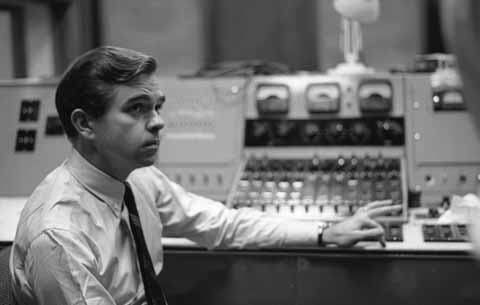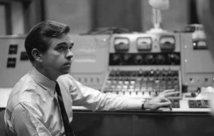His death was confirmed by Blue Note Records, where he spent decades as the key recording engineer, and by his nephew Gregg Van Gelder, who owns a music shop in upstate New York.
"His importance to the legacy of jazz cannot be overstated," Blue Note Records said in a statement on Facebook.
An optometrist by training, Van Gelder in the 1940s became determined to be a recording engineer -- a profession that barely existed at the time -- as he discovered live jazz in New York and became fascinated by radio.
He transformed his parents' living room in New Jersey into a recording studio where artists initially came over from New York for the competitive rates, as Van Gelder kept working as an optometrist to buy gear.
The immediacy of his sound -- which captured the rawness and subtleties of the instruments -- drew the attention of Blue Note, for which he first cut an album in 1953.
Van Gelder's techniques soon became known as the "Blue Note Sound." A key ingredient was his use of the then-new German-manufactured Neumann U47 microphone, which he altered and strategically placed to capture sound at close range.
"In those days -- even into the 1950s -- the quality of the equipment and records themselves couldn't keep up with what musicians were playing live," he told the blog JazzWax in 2012.
"I had to experiment to find the best way to set up musicians and microphones so the sound would be as warm and as realistic as possible," he said.
Van Gelder moved out of his parents' house to a more professional studio, inspired by a design by Frank Lloyd Wright, that he opened nearby in 1959.
He called "A Love Supreme" the most powerful of his recordings in the 1960s. But he said he only reached that conclusion in 2002, when he remastered the Coltrane album for a digital reissue and finally listened more leisurely to the music.
-----------------------------------------------------------------------------------------------------------
"His importance to the legacy of jazz cannot be overstated," Blue Note Records said in a statement on Facebook.
An optometrist by training, Van Gelder in the 1940s became determined to be a recording engineer -- a profession that barely existed at the time -- as he discovered live jazz in New York and became fascinated by radio.
He transformed his parents' living room in New Jersey into a recording studio where artists initially came over from New York for the competitive rates, as Van Gelder kept working as an optometrist to buy gear.
The immediacy of his sound -- which captured the rawness and subtleties of the instruments -- drew the attention of Blue Note, for which he first cut an album in 1953.
Van Gelder's techniques soon became known as the "Blue Note Sound." A key ingredient was his use of the then-new German-manufactured Neumann U47 microphone, which he altered and strategically placed to capture sound at close range.
"In those days -- even into the 1950s -- the quality of the equipment and records themselves couldn't keep up with what musicians were playing live," he told the blog JazzWax in 2012.
"I had to experiment to find the best way to set up musicians and microphones so the sound would be as warm and as realistic as possible," he said.
Van Gelder moved out of his parents' house to a more professional studio, inspired by a design by Frank Lloyd Wright, that he opened nearby in 1959.
He called "A Love Supreme" the most powerful of his recordings in the 1960s. But he said he only reached that conclusion in 2002, when he remastered the Coltrane album for a digital reissue and finally listened more leisurely to the music.
-----------------------------------------------------------------------------------------------------------









 Home
Home Politics
Politics











